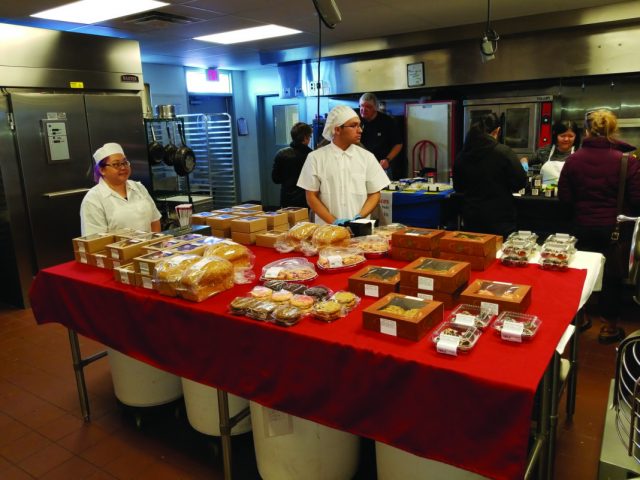
From our content partner Northside News
A typical morning at FEED Kitchens: three or four food carts in the deli kitchen prepping for their lunch rush. Healthy Food For All repackaging soup in the vegetable kitchen for distribution to food pantries and neighborhood centers. FEED Bakery Training Program staff and students hard at work in the bakery and training kitchens preparing the day’s orders. A spicemaker creating innovative mixes in the meat kitchen, while a saucemaker gets ready to bottle and label their product before delivery to Woodman’s or Willy Street Co-op. As a food business incubator and local food manufacturing facility, FEED is one of the most dynamic, diverse workplaces in Madison, and it’s all happening right here, in your Northside neighborhood.
FEED, which stands for Food Enterprise and Economic Development, is located in the NorthGate Shopping Center at the corner of Aberg and North Sherman Avenues. It’s that building in the parking lot that’s usually surrounding by food carts. It also happens to be home to the Northside Planning Council and almost 70 startup businesses and social enterprises.
FEED opened in November 2013 and, from the beginning, was envisioned to be a dedicated commercial kitchen space that lowers the barriers of entry for new food businesses. Because of the stringent health code requirements for food production, food entrepreneurs need specially designed and maintained facilities to produce food for sale. This can often mean an investment of tens or even hundreds of thousands of dollars in a sector that sees more startups fail than any other sector. Very few of us can afford that risk. Even fewer minority, low-income and women entrepreneurs can afford that risk. FEED makes it possible for almost anyone to take a shot at starting their own food business by making such facilities available for rent at an hourly rate.
FEED’s accessibility means that 45 percent of our member businesses are owned/co-owned by people of color, and 45 percent are owned/co-owned by women. In the five years since FEED has opened, it has served 130 businesses and supported more than 150 jobs. In addition, FEED has allowed NPC to create over 15 living wage jobs since its inception.
FEED is also home to the City of Madison’s MarketReady Program, a program that supports prospective Madison Public Market vendors who have historically faced barriers to entrepreneurship. And because self-employment is a known pathway to economic independence, FEED helps build stability for countless families as they build their businesses.
FEED is also a hub for food industry workforce development. It’s home to the FEED Bakery Training Program, which serves low-income, under- and unemployed adults and has now expanded to serve youth. Over the years, FEED has also hosted various other vocational training programs, such as Just Bakery and FoodWorks.
FEED is home to dozens of diverse businesses that produce healthy, culturally appropriate foods that are minimally processed and low in sodium and sugar. One of our goals at FEED is to build a food sovereign future where healthy, local food is available and affordable to everyone. This requires systems change — a change in who owns food businesses, what they produce and where they locate. FEED addresses these systemic challenges in healthy retail access by shifting ownership, production and decision-making to the very residents who are often considered food insecure. These entrepreneurs represent many communities whose food needs go
under-served or totally unmet. Because of FEED, they are the suppliers and even the retailers of the future.
Healthy Food for All is a prime example of FEED’s direct and measurable improvement in healthy food access. Since its inception 3 years ago, the program has collected and distributed over 80,000 pounds of local produce to families in need through food pantries, meal sites, community centers, and low-income senior centers. An additional 226,000 pounds of prepared food has been recovered and distributed in meal-sized packaging.
FEED also provides a 33% discount on rent to over 25 nonprofit agencies or programs so that they can have access to commercial kitchen space to prepare food for events, conduct trainings, and even operate social enterprises, all of which often serve food-insecure clientele.
After its first five years in operation, FEED has become a critical part of our local food system: by providing an accessible starting point for diverse, new food businesses; by acting as a point of intersection for local farmers, processors and entrepreneurs; by making it possible for farmers to create value-added, shelf-stable products that allow us to eat local throughout the year; and by creating connections that shorten the local food supply chain.
Happy 5th Anniversary, FEED! Come celebrate with us at the March 9 Taste the Future event.


































